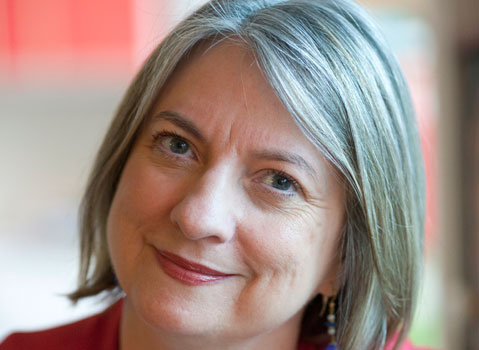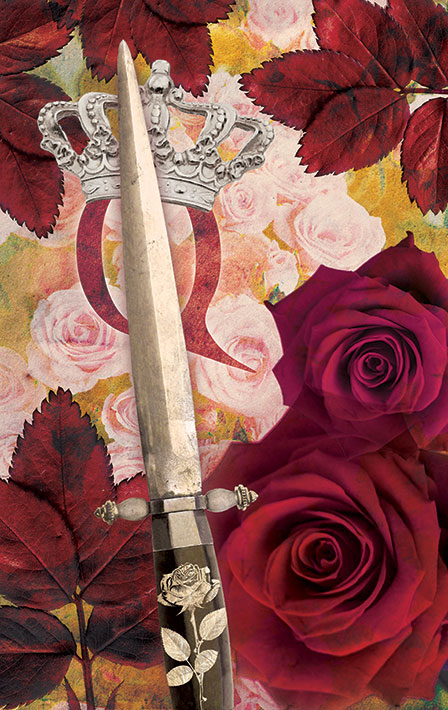The Equation of the Prose Poem

[Note: Each month we feature a guest post from a contributor to Poetry’s current issue. Molly Peacock’s “The Poet” and “Q’s Quest” appears in the December 2014 issue. Previous posts in this series can be found on the Editors’ Blog.]
Poetry = Innocence; Prose = Experience. Of those equations I used to be certain. Although I began to write in both genres as soon as I began my bi-national existence over twenty years ago, poetry and prose stayed as separate as the two currencies of the United States and Canada, one with the head of a president, the other with the visage of a queen. The prose poem? That would have been like Andrew Jackson in a set of triple-strand pearls on the $20 US. Or Queen Elizabeth II with a set of shaggy man-brows on the $20 CAN.
Me, I carried a wallet with a bill divider. No, I did not comprehend the prose poem.
Lyric poetry came from a deeply interior place, a preverbal dominion. Prose was the tool of consciousness. Inside its waking logic, the sentence articulated ideas and arguments. But the dream logic of the line articulated urges. “How shall I tell it?” is the narrative question. I never thought of how to tell a lyric poem. Only how to make one.
Poetry seeks to name; prose seeks to explain. Poems favor nouns; prose rides on verbs. Poems have a battery of techniques because they combine two kinds of music (line and sentence) yet devolve to a still point—as if music became a painting. Prose has one kind of music, seeming to barrel forward in comparative simplicity (phrases built into clauses built into sentences—c’est tout!).
And perhaps most importantly for me, poems follow from Innocence, or from not knowing. Prose follows from Experience, or knowing. It’s weird to equate New York City with innocence, but I did that, since there I began my young poetry life. Canada, where I married and began what I thought of as my maturity, I equated with experience.
Stories, I understood, as I waited in customs lines to declare goods and secure receipts for two different accountants to calculate taxes for two firmly separated governments, are not composed of lines.
Separation of church and state—fundamental isn’t it? In Canada we don’t bother with that. In Canada many poets also write prose, or, should I say that fiction writers like Anne Michaels, Michael Ondaatje, Susan Goyette, Margaret Atwood, Steven Heighton, and Jane Urquhart also write poetry. In Canada, having crossed a literary border that at first seemed thick and impermeable, I tried my hand at prose and wrote a memoir. Explanation had often been the source of my poems. (“Why not say what happened,” Elizabeth Hardwick famously advised Robert Lowell.) The leap to memoir was a likely one, but contrary to the usual ideas of inner searching, it was also a leap outward, into prose argument. I began to be fascinated by the rhythms of Experience, which, in grammatical terms, means that I began to be interested in the sentence. Memoir led me to consider the shape of a life in time. This, in turn, led me to biography.
Biography, with its commitment to scholarship and truth-telling, seems so much a part of the prose realm of Experience that it could almost be the anti-poem. There are very few poet biographers, but I became one when I wrote about the eighteenth-century collage artist Mary Delany in my book The Paper Garden. By that time the dualities in my life—two cultures (one in which two languages co-exist), two genres, a parliamentary system, a two-party system, not to mention two health care systems and myriad sets of eye-prints and fingerprints data-based in the Easy Entry Nexus machines—seemed natural. Synapses and their sparks.
But something else traveled across a synapse in my life, and still does: the currents of a life-long friendship in poetry. Astonishingly, Phillis Levin and I have been exchanging poems and talking about the nature of poetry for thirty-eight years. (We met as graduate students at the Writing Seminars at Johns Hopkins University.) Phillis delivered a brilliant lecture on pronouns at the Spalding University Brief Residency MFA program (where I taught before I retired). Then she gave an assignment based on Herbert Lomas’s sensual poem “Something, Nothing and Everything.”
Write a poem that repeats one pronoun in a number of places throughout, and at different intervals. Do not identify the noun/name/meaning of that pronoun. You yourself do not have to know its noun/name/meaning, either: it can be a mystery to you as well; or you may be on intimate terms with its nature, though unable/unwilling to name it.
I did the assignment and found myself writing ill-defined lines about a boy who felt he knew things he didn’t have words for. (His father told him that a thought didn’t exist until it was put into words.) So many pronouns accumulated that I broke down and named this fellow C. (He was a soft small c, but his father was a hard capital C.) Afterwards, I realized I had written a piece of a tiny biography in lines that were more sentence-driven than I felt a poem should be.
By then, after decades of crossings, the border between Canada and the United States had become more of a living membrane to me than a line. Now there are always two passports in my purse, as well as Toronto subway tokens and a New York City Metrocard. I never stopped writing lyric poems, but now I am almost always involved in a research project, too. I could do the whole alphabet, I thought banally after drafting the tale of that soft little c.
Alliteration gets a bum rap in contemporary poetry, but I wondered if I really paid attention to the roots of this Anglo-Saxon technique, whether a particular vocabulary might energize these range-y poems? The alliteration textured their surfaces. As the texture built, the narrative relaxed. Soon I was writing tiny biographical moments that I had made up entirely (for imaginative relief from the heavy lifting of biographical research). With an ease similar to that of balancing the quotidian dualities of my life, I blended the lines into sentences.
The blended genre sought both to name and to explain. It favored nouns—and, because of the alliteration—it rode on the backs of verbs. Sometimes it abandoned waking logic for dream logic. Its roots were internal and acknowledged its pre-verbal sources, but it was told. It aimed for a still point, but, crucially, it abandoned the double music of the line-plus-the-sentence for the single arrow of the sentence. In that respect, the blended genre had emigrated to prose. Yet poetry was absolutely the source, the birth country.
Eventually this project grew to twenty-six segments with a title: Alphabetique: 26 Characteristic Fictions.

Growing out of the years I had spent with the floral collages of Mary Delany, I yearned for a visual component to Alphabetique. In an imaginative move my Canadian publisher, McClelland & Stewart, responded to my suggestion of collaborating with a collage artist by finding one to work with me: Kara Kosaka. Collage itself is a blended genre, and Kosaka practices it magnificently. Her work here is an illustrated response to “The Poet” and “Q’s Quest.” The imagery that occurs normally in poetry occurs as the material of the collages. The recombination of the written work and the images enhances the notion of the prose poem. Kosaka’s collages also return the prose work to its poetic source: the nominative. Because nouns conjure up the objects in the collages, they bring the writing back to the moment of its imaginative birth.
Do Poems = Innocence? Does Prose = Experience? Traveling back and forth between two countries in literal and physical and virtual and figurative ways has made me understand that Innocence is never lost. We don’t live in a one-directional time line. The events of our lives circle in and out in such unexpected ways that we repeatedly find ourselves in states of unknowing, states of Innocence, the easiest example of this occurring when we’ve thought that things were one way, and they turn out to be another way. Then Experience reasserts itself: we have to revise our story. “The Poet” and “Q’s Quest” in the December 2014 issue are about exactly that.
Poet, essayist, short fiction writer, and biographer Molly Peacock was born in Buffalo, New York and...
Read Full Biography

